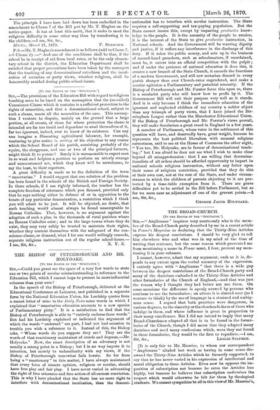THE BISHOP OF PETERBOROUGH AND MR. LIOLY0A 11 F.
[TO THE EDITOR OF THE "SPECTATOR:1
Sin,—Could you grant me the space of a very few words to state one or two points of secular misunderstanding in reference to the Education Bill, which I cannot hope to present in more influential columns than your own?
In the speech of the Bishop of Peterborough, delivered at the Educational Conference at Leicester, and published in a separate form by the National Education Union, his Lordship quotes from a recent letter of mine to the Daily News some words in which I explained that " unsectarian education amounts to a new species of Parliamentary piety." It is a satisfaction to find that the Bishop of Peterborough is able to "entirely endorse these words." But had his Lordship explained or indicated the argument of which the words " endorsed " are part, I had not had occasion to trouble you with a reference to it. Instead of this, the Bishop asks, "Whose words do you suppose they are? They are the words of that reactionary maintainer of creeds and dogmas,—Mr. Holyoake." Now, the exact description of an adversary is not usually a strong point in a Bishop ; but I in no way impute it to intention, but merely to unfamiliarity with my views, if the Bishop of Peterborough somewhat fails herein. So far from being a " reactionary" in this matter, I have always maintained that every form of sincere opinion, religious or secular, should have free play and fair play. I have never varied in advocating the right of free utterance and free action of all earnest conviction. This is why I have pleaded that the State has no more right to interfere with denominational inculcation, than the denomi- nationalist has to interfere with secular instruction. The State requires a self-supporting and tax-paying population. But the State cannot insure this, except by imparting productive know- ledge to the people. It is the necessity of the people to receive, it is the interest of the State to give productive instruction, in National schools. And the Government will be wanting dignity and justice, if it suffers any interference in the discharge of this. duty. If it takes the public money, and sets up in the business of second-hand preachers, such as schoolmasters, if unordained, must be, it enters into an official competition with the pulpit;: and if under the pretence of national education it does this, it creates a new branch of the State Church, it exceeds the functions of a modern Government, and will sow sectarian discord in every parish sharper than ever Church-rates engendered, and make a secular agitation a Parliamentary and parochial necessity. If the Bishop of Peterborough and Mr. Forster force this upon us, there is a secularist party who will know how to profit by it. The- Government Bill will suit their purpose very well as it stands.. And it is only because I think the immediate education of the ignorant and neglected children of my country a nobler object than any triumph of party views, that I have joined the Bir-- mingham League rather than the Manchestor Educational Union. If the Bishop of Peterborough and Mr. Forster's views prevail,. they will make Secularism a great creed in England in a few years..
A member of Parliament, whose voice in the settlement of this. question will have, and deservedly have, great weight, because he- represents the best political liberalism with unusual religious. earnestness, said to me at the House of Commons the other night,. "You too, Mr. Holyoake, are in favour of denominational teach- ing ;" but I am afraid he does not see what I wish to make clear- beyond all misapprehension : that I am willing that denomina- tionalists of all orders should be afforded opportunity to impart in national schools religious instruction, without any fetter upon. their sense of religious conviction, provided that they do this. at their own cost, not at the cost of the State, and under circum- stances in which the children of parents objecting to it are pro- tected by a time-table exemption from it. There are grave- difficulties yet to be settled in the Bill before Parliament, but so. far we seem near an adjustment of one of the gravest points.—L am, Sir, &c.,
GEORGE JACOB HOLYOAKE.


































 Previous page
Previous page